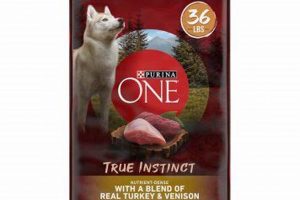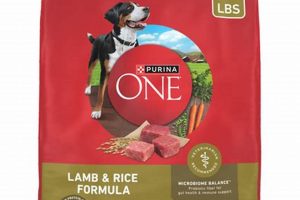Selecting the optimal nutritional source for a Jack Russell Terrier involves careful consideration of its unique needs. The breed’s high energy levels and propensity for certain health conditions necessitate a diet formulated to support their active lifestyle and minimize potential risks. This choice plays a pivotal role in maintaining overall wellness and longevity.
Providing appropriate nourishment contributes significantly to a Jack Russell’s vitality and well-being. A balanced diet helps manage weight, support joint health, and promote a healthy coat. Historically, terrier breeds required diets that provided sustained energy for hunting activities; while the modern Jack Russell is often a companion animal, this legacy continues to influence their nutritional requirements.
Subsections will address key aspects to consider when choosing a suitable diet, including ingredient analysis, life stage considerations, specific health concerns, and feeding guidelines. This information aims to empower owners to make informed decisions regarding their Jack Russell Terrier’s dietary needs.
Dietary Guidance for Jack Russell Terriers
Selecting the appropriate diet for a Jack Russell Terrier requires careful consideration of its specific needs. The following guidelines provide a framework for making informed decisions regarding nutritional choices.
Tip 1: Prioritize High-Quality Protein Sources: A diet rich in animal-based protein is crucial for maintaining muscle mass and supporting energy levels. Look for named protein sources such as chicken, lamb, or fish listed as the primary ingredients.
Tip 2: Consider Activity Level: Adjust caloric intake based on the dog’s activity level. Highly active Jack Russells require more calories than those with a sedentary lifestyle. Observe body condition and adjust portions accordingly.
Tip 3: Monitor Fat Content: While fat is essential for energy and nutrient absorption, excessive amounts can lead to weight gain. Choose a food with a moderate fat content, typically between 12% and 18% on a dry matter basis.
Tip 4: Include Fiber for Digestive Health: Fiber promotes healthy digestion and can help regulate bowel movements. Look for ingredients such as beet pulp, brown rice, or pumpkin.
Tip 5: Be Mindful of Potential Allergens: Jack Russells can be prone to food sensitivities. Common allergens include wheat, corn, and soy. Consider grain-free or limited-ingredient diets if allergies are suspected.
Tip 6: Choose Age-Appropriate Formulas: Puppies, adults, and senior dogs have different nutritional needs. Select a formula specifically designed for the dog’s life stage.
Tip 7: Supplement Strategically: Consult with a veterinarian before adding supplements. Omega-3 fatty acids can benefit skin and coat health, while glucosamine and chondroitin may support joint function.
These guidelines offer a starting point for optimizing a Jack Russell Terrier’s diet. Individual needs may vary, necessitating consultation with a veterinary professional.
The subsequent section will explore specific dietary recommendations for common health concerns in Jack Russell Terriers.
1. High-quality Protein
The selection of a suitable diet for a Jack Russell Terrier hinges significantly on the inclusion of high-quality protein. This macronutrient is not merely a component, but a cornerstone of their nutritional needs, impacting muscle development, energy provision, and overall physiological function. The following facets elaborate on the critical role of protein in a terrier’s diet.
- Muscle Maintenance and Development
Protein serves as the fundamental building block for muscle tissue. Jack Russell Terriers, known for their agility and robust musculature, require sufficient protein intake to maintain existing muscle mass and support ongoing development, particularly during growth stages. Diets lacking adequate protein can lead to muscle atrophy and reduced physical performance.
- Energy Provision and Metabolic Function
Protein contributes to the energy needs of a Jack Russell, especially during periods of intense activity. While carbohydrates are a primary energy source, protein plays a supplementary role, ensuring sustained energy release. Furthermore, protein is essential for numerous metabolic processes, including enzyme production and hormone regulation.
- Immune System Support
Amino acids, the building blocks of protein, are crucial for the synthesis of antibodies and other immune components. A diet rich in high-quality protein supports a robust immune system, enabling the dog to effectively combat infections and diseases. Protein deficiencies can compromise immune function, increasing susceptibility to illness.
- Digestibility and Amino Acid Profile
The digestibility of protein and its amino acid profile are paramount. Highly digestible protein sources, such as poultry or fish, are more readily absorbed and utilized by the body. A complete amino acid profile ensures that the dog receives all the essential amino acids necessary for optimal health. Incomplete or poorly digestible protein can lead to nutrient deficiencies and digestive upset.
In conclusion, high-quality protein is a non-negotiable element in formulating the appropriate dietary regimen for a Jack Russell Terrier. Its influence spans across multiple physiological systems, ensuring vitality, strength, and overall health. The source, digestibility, and amino acid composition of the protein must be carefully evaluated to optimize the benefits for this active and energetic breed.
2. Appropriate Calorie Density
Calorie density, a critical consideration when selecting nutrition for a Jack Russell Terrier, reflects the concentration of energy within a given quantity of food. Matching this density to the dog’s activity level and metabolic needs is essential for maintaining optimal body condition and overall health.
- Matching Energy Expenditure
Jack Russell Terriers exhibit a wide range of activity levels, from highly energetic individuals participating in canine sports to more sedentary companions. The caloric density of the food must align with the dog’s daily energy expenditure. Insufficient calorie density can lead to weight loss and reduced vitality in active dogs, while excessive density can cause weight gain and associated health problems in less active individuals. A food’s feeding guidelines serve as a starting point, but adjustments based on individual needs are often necessary.
- Preventing Obesity and Maintaining Ideal Weight
Obesity is a prevalent health concern in dogs, and Jack Russell Terriers are not immune. A diet with an inappropriately high calorie density contributes significantly to weight gain. Maintaining an ideal body weight is crucial for preventing or mitigating the risk of conditions such as arthritis, diabetes, and cardiovascular disease. Regularly monitoring body condition score and adjusting food intake are essential components of weight management.
- Life Stage Considerations
Caloric needs vary significantly across different life stages. Puppies require a higher calorie density to support rapid growth and development, while senior dogs often benefit from a lower density to account for decreased activity and metabolic rate. Choosing a life-stage-specific formula ensures that the dog receives the appropriate caloric intake to meet its changing needs. For example, a “puppy” formula will have a higher density than a “senior” formula.
- Impact on Metabolic Health
Chronic overconsumption of calories, even from “healthy” sources, can negatively impact metabolic health. It contributes to insulin resistance, elevated blood glucose levels, and increased risk of metabolic disorders. Carefully managing calorie density helps maintain metabolic homeostasis and reduces the likelihood of developing these conditions. The selection of foods with appropriate macronutrient ratios, including protein, fat, and carbohydrates, further supports metabolic health.
The aforementioned facets underscore the integral role of appropriate calorie density when choosing the optimal diet for a Jack Russell Terrier. Balancing energy intake with expenditure, considering life stage needs, and monitoring body condition are key components of ensuring long-term health and well-being. Overlooking this element can have detrimental effects on the dog’s quality of life.
3. Joint Health Support
Joint health support is a crucial aspect of selecting optimal nutrition for a Jack Russell Terrier, due to the breed’s predisposition to certain joint-related conditions. The connection stems from the proactive role that dietary components can play in mitigating the risk of developing, or managing the symptoms of, conditions such as patellar luxation and hip dysplasia. The inclusion of specific nutrients is not merely a beneficial addition, but a preventative measure with tangible effects on mobility and quality of life. For instance, a Jack Russell exhibiting early signs of joint stiffness may experience improved comfort and range of motion with a diet enriched with glucosamine and chondroitin, substances known to support cartilage health.
Beyond supplementation, the maintenance of a healthy weight, facilitated by a balanced diet, directly impacts joint stress. Excess weight exacerbates existing joint problems and accelerates the degeneration of cartilage. Thus, appropriate calorie density, coupled with ingredients that promote lean muscle mass, is essential for minimizing mechanical load on joints. Diets rich in omega-3 fatty acids, derived from fish oil or flaxseed, also offer anti-inflammatory benefits, potentially reducing joint pain and improving mobility. The combined effect of these nutritional strategies can translate to a more active and comfortable life for the dog.
In summary, joint health support represents an indispensable element in formulating the appropriate nutritional strategy for a Jack Russell Terrier. By proactively addressing potential joint issues through targeted dietary interventions, owners can significantly contribute to their dog’s long-term mobility and overall well-being. The understanding of this connection allows for informed decision-making, fostering a preventative approach to canine health management. Overlooking this facet can result in compromised joint function and diminished quality of life.
4. Digestive Sensitivity Mitigation
Digestive sensitivity mitigation is a pivotal consideration in the selection of appropriate nutrition for a Jack Russell Terrier. This breed, while robust, can exhibit sensitivities to certain dietary components, necessitating a tailored approach to minimize gastrointestinal upset and maximize nutrient absorption. The factors outlined below delineate the key elements of this mitigation strategy.
- Limited Ingredient Diets
Limited ingredient diets (LIDs) reduce the number of potential allergens or irritants in the food. These diets typically feature a single source of animal protein and a limited number of carbohydrate sources. For instance, a Jack Russell exhibiting signs of food sensitivity, such as skin irritation or digestive upset, may benefit from a LID formulated with novel proteins like duck or venison. These proteins are less likely to trigger an immune response compared to more common sources like chicken or beef.
- Hydrolyzed Protein Formulas
Hydrolyzed protein formulas contain proteins that have been broken down into smaller peptides, reducing their allergenic potential. The hydrolysis process alters the protein structure, preventing the immune system from recognizing it as a threat. This approach is particularly useful for dogs with severe food allergies or inflammatory bowel disease (IBD). A hydrolyzed protein diet can minimize digestive distress and promote nutrient absorption in sensitive individuals.
- Grain-Free Options
While not all grains are inherently problematic, some Jack Russells may exhibit sensitivities to specific grains, such as wheat or corn. Grain-free diets, which replace grains with alternative carbohydrate sources like sweet potatoes or peas, can be beneficial for these dogs. However, it’s essential to ensure that grain-free diets are nutritionally balanced and do not contain excessive amounts of other potentially problematic ingredients. Furthermore, the absence of grains does not automatically equate to a hypoallergenic diet.
- Prebiotics and Probiotics
Prebiotics and probiotics promote a healthy gut microbiome, which is essential for optimal digestion and immune function. Prebiotics are non-digestible fibers that nourish beneficial bacteria in the gut, while probiotics are live microorganisms that directly contribute to a balanced gut flora. Supplementing the diet with prebiotics and probiotics can improve digestive health, reduce inflammation, and alleviate symptoms of digestive upset in sensitive Jack Russell Terriers. Sources of prebiotics include chicory root and fructooligosaccharides (FOS), while probiotics are found in fermented foods or specialized supplements.
These considerations are fundamental to mitigating digestive sensitivities in Jack Russell Terriers and, consequently, selecting the optimal nutritional source. A proactive and informed approach, often involving consultation with a veterinary professional, is crucial for ensuring the dog’s digestive health and overall well-being.
5. Skin/Coat Nourishment
Skin and coat condition serves as a readily observable indicator of a Jack Russell Terrier’s overall health, directly influenced by nutritional intake. A dull, brittle coat, accompanied by skin irritation or excessive shedding, frequently signals dietary deficiencies or sensitivities. Conversely, a glossy coat and healthy skin typically reflect adequate nourishment. The selection of dietary components, therefore, becomes paramount in maintaining integumentary health. For instance, a Jack Russell with a zinc deficiency may exhibit dermatitis and hair loss, conditions potentially ameliorated by incorporating zinc-rich ingredients or supplements into the diet. Similarly, insufficient essential fatty acids can manifest as dry, flaky skin, a condition often resolved through the addition of omega-3 and omega-6 fatty acids to the nutritional regimen. The type of protein present in the food also impacts skin and coat health. Protein quality affects the body’s ability to produce keratin, the main structural component of hair.
The inclusion of specific nutrients directly affects skin barrier function, reducing the likelihood of allergic reactions and infections. Ingredients such as vitamin E and vitamin A contribute to skin cell integrity and immune defense within the skin. Real-world examples include Jack Russells with allergies experiencing fewer flare-ups when fed diets formulated with hydrolyzed proteins or limited ingredients, reducing exposure to common allergens. The practical significance lies in preventative care; selecting a well-formulated diet, complete with essential nutrients, minimizes the need for costly veterinary interventions related to skin and coat issues. Furthermore, understanding this connection empowers owners to proactively address potential problems through dietary adjustments, enhancing the dog’s comfort and appearance.
In conclusion, skin and coat nourishment represents an indispensable aspect of selecting the optimal diet. Addressing potential deficiencies and incorporating targeted nutrients fosters a healthy integumentary system, contributing significantly to overall well-being. Challenges may arise in identifying specific sensitivities or deficiencies, necessitating veterinary consultation and potentially, dietary trials. Recognizing the interplay between nutrition and dermatological health underscores the importance of informed decision-making in canine care.
6. Life Stage Formula
Optimizing nutritional intake for a Jack Russell Terrier necessitates consideration of its current life stage. Different life stages present distinct nutritional demands, influencing the selection of appropriate dietary formulations.
- Puppy Development
Jack Russell Terrier puppies require diets formulated to support rapid growth and skeletal development. Puppy-specific formulas typically feature higher levels of protein, calcium, and phosphorus than adult formulations. This increased nutrient density supports bone mineralization and muscle mass accrual during this critical growth phase. Deficiencies in these nutrients can lead to skeletal abnormalities, such as angular limb deformities. The selection of a puppy-specific formula is, therefore, essential for ensuring proper development.
- Adult Maintenance
Adult Jack Russell Terriers benefit from balanced diets that maintain lean muscle mass and support their active lifestyle. Adult maintenance formulas generally contain moderate levels of protein, fat, and carbohydrates. Overfeeding, even with a high-quality adult formula, can lead to obesity, increasing the risk of joint problems and other health issues. Portion control and regular exercise are crucial components of maintaining a healthy weight in adult Jack Russell Terriers.
- Senior Considerations
Senior Jack Russell Terriers often experience decreased metabolic rates and reduced activity levels. Senior-specific formulas typically contain lower calorie densities and may include added fiber to promote digestive health. Glucosamine and chondroitin are often included to support joint function, addressing the increased risk of arthritis in older dogs. Adjustments to feeding regimens based on individual needs are particularly important for senior dogs.
- Reproductive Needs
Pregnant or lactating Jack Russell Terriers require increased caloric and nutrient intake to support fetal development and milk production. Gestation and lactation formulas generally contain higher levels of protein, fat, and calcium. These formulas provide the necessary building blocks for growing puppies and ensure adequate milk production for nursing. Veterinary consultation is recommended to determine specific dietary needs during these reproductive phases.
The selection of a life-stage-appropriate formula represents a crucial component of ensuring optimal nutrition for a Jack Russell Terrier. Failure to account for changing nutritional needs throughout the dog’s lifespan can lead to health problems and reduced quality of life. Careful consideration of these factors facilitates informed dietary choices.
Frequently Asked Questions About Canine Nutrition for Jack Russell Terriers
The following addresses common inquiries regarding the selection of optimal canine nutrition, particularly concerning Jack Russell Terriers.
Question 1: What constitutes “best dog food for jack russell”?
The phrase refers to a dietary regimen tailored to the specific physiological and metabolic needs of the Jack Russell Terrier breed. It encompasses considerations of protein quality, caloric density, and ingredient composition to promote optimal health and well-being.
Question 2: Why can’t “best dog food for jack russell” be standard?
General canine diets may not adequately address breed-specific predispositions to certain health conditions, such as patellar luxation or skin sensitivities. A customized approach, considering these factors, is often necessary.
Question 3: How crucial is protein in the “best dog food for jack russell”?
Protein plays a vital role in supporting muscle maintenance, energy provision, and immune function in this active breed. High-quality, animal-based protein sources should constitute a significant portion of the diet.
Question 4: What ingredients should be avoided in the “best dog food for jack russell”?
Common allergens, such as wheat, corn, and soy, should be avoided, particularly in dogs exhibiting signs of food sensitivity. Artificial additives and preservatives should also be minimized.
Question 5: Does life stage impact the selection of “best dog food for jack russell”?
Life stage significantly influences nutritional needs. Puppy formulas require higher levels of protein and certain minerals, while senior formulas may benefit from reduced calorie density and added joint support ingredients.
Question 6: How does “best dog food for jack russell” influence overall health?
Appropriate nutrition contributes to optimal weight management, joint health, digestive function, and skin/coat condition, ultimately enhancing the dog’s quality of life and longevity.
Selecting appropriate nutrition demands careful consideration of individual needs and breed-specific predispositions. Consulting with a veterinary professional is advisable for personalized recommendations.
The subsequent section will provide a checklist for evaluating canine nutrition choices.
Conclusion
The exploration of optimal canine nutrition, specifically the selection criteria associated with “best dog food for jack russell,” reveals a multifaceted landscape. Breed-specific requirements, encompassing caloric needs, macronutrient ratios, and potential sensitivities, dictate a departure from generic dietary solutions. Prioritization of high-quality ingredients, acknowledgment of life stage variations, and proactive management of potential health concerns form the cornerstones of informed decision-making. Deviation from these principles can result in suboptimal health outcomes and a diminished quality of life for the animal.
The responsibility for ensuring adequate nutrition rests ultimately with the owner. Continued vigilance, informed by veterinary consultation and ongoing assessment of the animal’s physiological responses, is paramount. The investment in appropriate nutrition represents a commitment to the long-term health and well-being of the Jack Russell Terrier, yielding tangible benefits that extend far beyond mere sustenance. This commitment necessitates a critical and discerning approach to the selection of nutritional resources.







